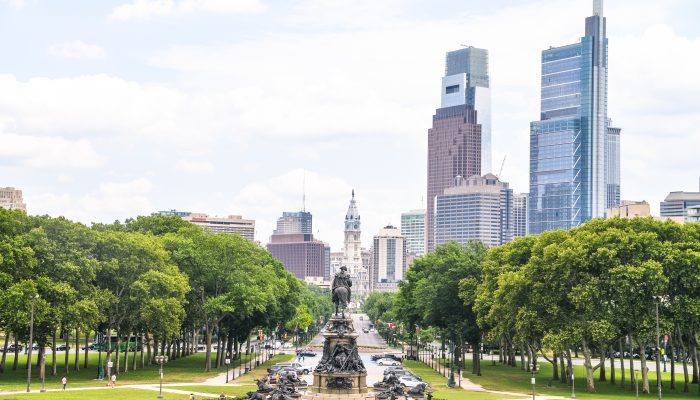Our money matters
Mayor Jim Kenney explains why Philadelphia and all of America needs the American jobs plan


Over that past year, we’ve felt a deep collective grief that will forever bind us and define our place in history. While shaped by the pandemic, fear must not hold us back from realizing the immense power and potential we have together to reshape and redefine our economy.
We can reimagine the role of government to work for working families who are fighting to survive. The Biden Administration’s American Jobs Plan represents a once–in–a–generation opportunity to do this while jumpstarting America’s—and Philadelphia’s—economic recovery.
Infrastructure is the foundation of our economy. Infrastructure makes it possible for people to participate in the workforce and enables businesses to start and grow. But infrastructure must also be continually invested in as times change and the needs and movements of people and businesses evolve.
The Philadelphia economy of today looks far different than the Philadelphia economy of the 1950s. A major infrastructure investment shouldn’t only be geared toward the needs of the past, or even of the present—it should look toward the future.
Traditional infrastructure
We need major investments in our aging “traditional” infrastructure. Our region’s roads, bridges, and transit systems have suffered decades of underinvestment. Our water and sewer systems and electric grid are desperately in need of upgrades and modernization to make them safer, more reliable, and more efficient. And, after the COVID-19 pandemic, the need for universal internet access to enable participation in school, work, and public services should not even be up for debate.
Rethinking infrastructure
To build the prosperous and equitable future our children deserve, investing in roads, bridges, transit, and even broadband is not enough. We must think boldly about investing in all of the critical infrastructure that will be needed to support a modern economy not just ten or twenty years from now, but far into the future. That means investing in housing and care infrastructure, strengthening climate resilience, and addressing racial injustice. This is why we need Congress to pass the American Jobs Plan.
Housing is infrastructure
Philadelphia faces an affordable housing crisis. In 2018, about 231,000 Philadelphia households, or 40 percent of all households, spent more than 30 percent of their income on housing, and currently, there are over 40,000 people on the waitlist for public housing. Facing this tremendous need, a commitment to creating and preserving affordable housing would provide a critical foundation for Philadelphia’s families.
Research shows that housing stability is connected to economic security, better educational performance, and improved health outcomes, especially for children—all of which contribute to a stronger, healthier economy in the long run. A major investment in our housing infrastructure can pave the way for these opportunities while creating good jobs for workers building and retrofitting energy-efficient and healthy homes.
The care economy is infrastructure
The availability of high-quality, affordable care options—including child care and home and community-based long-term care services for people with disabilities and older adults —makes it possible for people to participate in the workforce. Today, there are not enough care providers to meet demand, let alone to accommodate the expected future needs of our country’s aging population.
To prepare for the care needs of the future requires investing in care facilities and improving the quality of care jobs—with living wages, benefits, and workplace protections for caregivers. Better jobs mean better care. Studies have shown that paying higher wages to care workers improves the quality of care.
Investing in the care economy is also an equity imperative. Insufficient care infrastructure means that people have to drop out of the workforce to take on unpaid family care responsibilities, which disproportionately fall on women. We saw this trend during the COVID-19 pandemic when, incredibly, all of the 156,000 jobs lost in December 2020 were among women, and rates of unemployment were higher for Black and Latina women. That’s why investment in the care economy would benefit women and especially women of color, who are overrepresented in care jobs. 13 percent of all Black-owned businesses are child care providers, and Pennsylvania’s long-term care workforce is 86 percent women and nearly 40 percent people of color. This stands in contrast to “traditional” infrastructure, where investments often flow to sectors that predominantly employ men, like construction.
Climate resilience is infrastructure
With all we know from climate science, it would be incredibly short-sighted to pass a major infrastructure package that does not seek to meet the biggest challenge of our time: climate change. Without major reductions in the amount of carbon emitted, devastation will be the result—and because of long-standing systemic racism, these impacts will be felt first and worst by our Black, brown, and low-income neighborhoods.
The facts are clear: Philadelphia is getting hotter and wetter. Philadelphia’s Heat Vulnerability Index shows that some neighborhoods can be as much as 22 degrees hotter than others and that neighborhoods facing extreme heat are more likely to have predominantly low-income residents or residents of color.
Investments to prevent or protect against the increasingly common occurrence of extreme weather events are not only money well-spent, but they will pay dividends as we face an uncertain climate future.
The American Jobs Plan will provide millions of jobs and will pay for itself by closing corporate tax loopholes and ensuring that corporations are paying their fair share toward America’s infrastructure—an infrastructure that they have for decades used to build and grow their companies.


